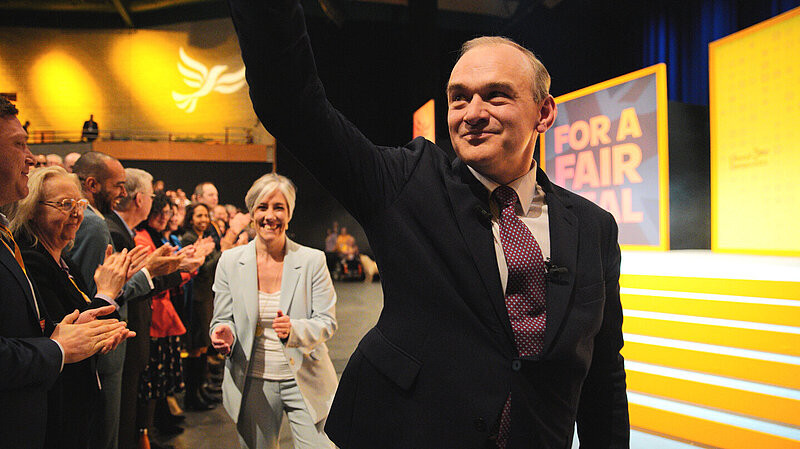A deep-dive into policy decisions, division, and questions over maintaining a coherent Lib Dem identity
The Liberal Democrat Conference (September 23-26) took place in Bournemouth and was a chance for members to find out more about party leadership and to vote on policy motions that will then become party policy.
The voting process at the Liberal Democrat conference differs from that of its main rivals. At Labour conferences, 50% of votes are allocated to affiliated organisations, such as trade unions, and voting is restricted to nominated representatives, known as delegates. At Conservative conferences, votes are traditionally not held. In contrast, at Lib Dem conferences every party member who attends can vote on policies. This makes for a more democratic system, but one where divisions and disagreements are made plain.
Below is an overview of the policies that were debated, voted on, and passed at the 2023 conference.
Policy summary
Saturday
Combating Human Trafficking and Modern Slavery
A Fair Deal for the Armed Forces Community
Bring Back the Industrial Strategy
A Better Start in Life
Restore Standards in Public Life
Ending Period Poverty
Sunday
Making the Fight Against Climate Change Accessible
Fixing Fast Fashion – Reduce, Reuse, Recycle
Transforming the Nation’s Health
Investing in our Children’s Future
Protecting our Neighbourhoods – A Return to Community Policing
Monday
Connecting Communities – Building a Transport Network Fit for the 21st Century
Scrap the Voter ID Scheme
Tackling the Housing Crisis
Standing with Ukraine
Tuesday
Protecting the European Convention on Human Rights
A Child Maintenance Service that Works for Children
Tackling the Nature Crisis
Campaign for Gender Balance
Key conference takeaways
Election strategy to target the “Blue Wall”
The Lib Dems are targeting traditional Tory voters in the south-east Blue Wall. This strategy has been working: the Lib Dems have gained four more seats following Davey’s rise to leadership in in 2020, when the party had just 11 MPs. 15 MPs in Parliament does not sound like a huge victory, but these four seats represent a massive change for the party: Liberal Democrat MPs are now in power in areas where there were huge Conservative majorities in the polls since 2021.
Continuing this successful strategy, the Lib Dems are now prioritising the Blue Wall over establishing a national policy. They are focusing on issues like sewage, the NHS, and the cost-of-living crisis, instead of more traditional Lib Dem policies, such as electoral reform and reversing Brexit. Now, in interviews with the media on Sunday the 24th of September, Liberal Democrat leader Ed Davey refused to confirm whether the party would like to rejoin the EU, although that is part of their official policy. He spoke only of improving the trade deal with the EU.
Some party activists at the conference raised concerns that Lib Dems identity and message is being diluted in their efforts to appeal to Conservative voters in Blue Wall consistencies. They argued that Lib Dem candidates are acting similarly to Labour, who are also being vague on policy positions. It seems that both parties are focusing on getting the Tories out, and keeping their cards close to their chest. This ‘Smash-the-Blue-Wall’ strategy has proven unpopular with some Lib Dems members, dividing the party. For example, at the Conference party leadership faced criticism of their plan to scrap a target of building 380,000 new homes per year. Davey has pledged he will not build homes on the green belt, in an attempt to win the support of previously Tory voters.
Helen Morgan, the spokesperson for the Lib Dems on housing and communities, argued it would be better to create local targets to “bring communities with us”, as the national target has “been in place for decades, and has utterly failed to deliver the homes we need”.
However, an amendment to the motion presented by the Young Liberals to restore the 380,000 target was overwhelmingly passed, a real challenge to leadership. Janey Little, chair of the Young Liberals, argued that scrapping it risked alienating younger voters who were “fearful for our futures when homes are so unaffordable”, to loud applause.
Stephen Robinson, the leader of Chelmsford council, warned that a decision to scrap the target could prove as damaging as the party’s decision to back university tuition fees during their coalition with the Conservatives from 2010-2015.
Now, it seems that the Lib Dems might be forming a coalition with Labour in order to get the Tories out. However, Davey has refused to say whether he would support a Labour minority government in the event of a hung parliament.. He has just said that he wants to give his party more sway by winning more MPs. It seems that he is determined to do this by whatever means necessary, even if it makes him unpopular within his party.
In his speech closing the Conference, Ed Davey argued that Labour’s approach is: “Lower your sights. Give up on really changing things. Make your pitch nothing more than ‘not as bad as the Tories’…Half-heartedly oppose what the Conservatives are doing, and then shrug your shoulders and say ‘we’d pretty much do the same thing.’” Ironic, given his election strategy is appealing to Tory voters in one section of the country, instead of developing a concrete, nationwide plan for reversing the damage that the Tories have done.
NHS reform
You might have seen clips of Liberal Democrat leader Ed Davey’s speech on the news, the part of these conferences that everyone is waiting for. It was a very personal, emotional speech, drawing on the sad passing of his parents due to cancer when he was growing up. It gave personal backing to the decision to make treating cancer ‘a top priority in the next Parliament’. He called for a cross-party consensus to make the NHS target of a two-month waiting time to receive urgent cancer treatment in England to be written into law. Right now, 40% of people wait longer. Interestingly, the health secretary would be held accountable for a failure to meet the standard, first of all via the health service ombudsman, and then potentially through the courts. The idea perhaps draws on the absolute outrage that followed the Conservative government’s mishandling of the pandemic and partygate..
NHS Confederation director of policy Dr Layla McCay, who has attended the Conference, responded to the Lib Dems’ policy on the NHS by saying, “It’s not clear how the proposed legislation to guarantee patients with urgent cancer referrals are seen within two months would be implemented, particularly in a context with over 100,000 vacancies in the NHS.”
However, she continued, “NHS leaders will also welcome the emphasis the Liberal Democrats are putting on health in their general election campaign and we look forward to seeing more of their proposed policies.”
Like many, it seems that McCay is supportive of these policies, but unsure of how they will be funded in order to be implemented, as well as how the existing crisis within the NHS, with vacancies and ongoing strike action, will be addressed.
Key education reforms
Hand schools and colleges £390m a year to offer free small-group tutoring to 1.75 million. The Tories have decided not to fund a national school-based tutoring programme after summer 2024.
Increase per-student funding in schools and colleges above inflation every year.
Extend the pupil premium, a grant provided to schools to support the attainment of disadvantaged pupils from reception to Year 11 currently, to students aged between 16 and 18.
Every adult to receive a £10,000 “skills wallet” to spend on “education and training throughout their lives”. When first introduced as a policy, the party said they would put the cash into a “skills wallet” over a thirty-year period; £4,000 by the age of 25, £3,000 at 40 and another £3,000 at 55.
Increase apprentice pay to “at least the minimum wage” to counter high dropout rates, and to expand the “broken” apprenticeship levy into a “broader and more flexible” skills and training levy.
Reversing the Tories’ policy of “stopping the boats”
Former Lib Dem leader Tim Farron claimed, “We will scrap the absolutely appalling Illegal Migration Act in full – no caveats, no excuses, no cowardly backtracking. That act gets ripped up on day one of a Liberal Democrat administration.” He also accused Labour of “slipping back into New Labour habits” and being “too scared of tabloids to risk being seen to be on the side of those in desperate need of sanctuary and liberation.”
Overall, it is unclear where the Liberal Democrats really stand on policies such as the EU, their targets for building affordable homes, and how they plan to fund their ambitious plans for the NHS. To me, if there was less focus on appealing to certain voters in local areas, and more on developing a strategy that thinks of communities nationwide, party confidence would dramatically increase.










0 Comments